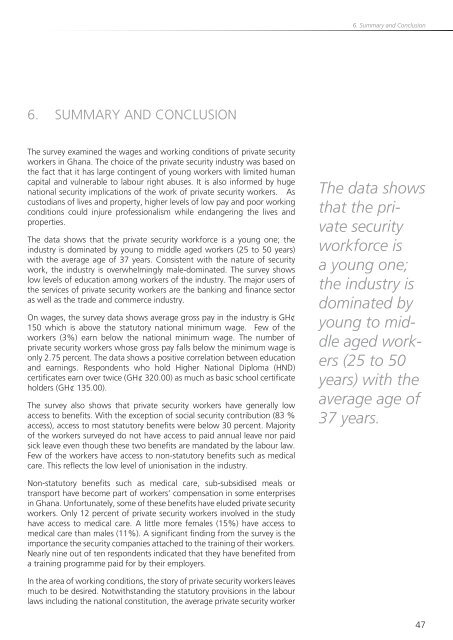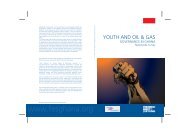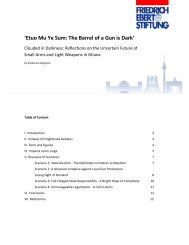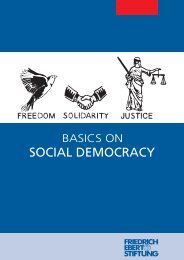Wages and Working Conditions of Private Security Workers in Ghana
Wages and Working Conditions of Private Security Workers in Ghana
Wages and Working Conditions of Private Security Workers in Ghana
You also want an ePaper? Increase the reach of your titles
YUMPU automatically turns print PDFs into web optimized ePapers that Google loves.
6. Summary <strong>and</strong> Conclusion<br />
6. SUMMARY AND CONCLUSION<br />
The survey exam<strong>in</strong>ed the wages <strong>and</strong> work<strong>in</strong>g conditions <strong>of</strong> private security<br />
workers <strong>in</strong> <strong>Ghana</strong>. The choice <strong>of</strong> the private security <strong>in</strong>dustry was based on<br />
the fact that it has large cont<strong>in</strong>gent <strong>of</strong> young workers with limited human<br />
capital <strong>and</strong> vulnerable to labour right abuses. It is also <strong>in</strong>formed by huge<br />
national security implications <strong>of</strong> the work <strong>of</strong> private security workers. As<br />
custodians <strong>of</strong> lives <strong>and</strong> property, higher levels <strong>of</strong> low pay <strong>and</strong> poor work<strong>in</strong>g<br />
conditions could <strong>in</strong>jure pr<strong>of</strong>essionalism while endanger<strong>in</strong>g the lives <strong>and</strong><br />
properties.<br />
The data shows that the private security workforce is a young one; the<br />
<strong>in</strong>dustry is dom<strong>in</strong>ated by young to middle aged workers (25 to 50 years)<br />
with the average age <strong>of</strong> 37 years. Consistent with the nature <strong>of</strong> security<br />
work, the <strong>in</strong>dustry is overwhelm<strong>in</strong>gly male-dom<strong>in</strong>ated. The survey shows<br />
low levels <strong>of</strong> education among workers <strong>of</strong> the <strong>in</strong>dustry. The major users <strong>of</strong><br />
the services <strong>of</strong> private security workers are the bank<strong>in</strong>g <strong>and</strong> f<strong>in</strong>ance sector<br />
as well as the trade <strong>and</strong> commerce <strong>in</strong>dustry.<br />
On wages, the survey data shows average gross pay <strong>in</strong> the <strong>in</strong>dustry is GH¢<br />
150 which is above the statutory national m<strong>in</strong>imum wage. Few <strong>of</strong> the<br />
workers (3%) earn below the national m<strong>in</strong>imum wage. The number <strong>of</strong><br />
private security workers whose gross pay falls below the m<strong>in</strong>imum wage is<br />
only 2.75 percent. The data shows a positive correlation between education<br />
<strong>and</strong> earn<strong>in</strong>gs. Respondents who hold Higher National Diploma (HND)<br />
certificates earn over twice (GH¢ 320.00) as much as basic school certificate<br />
holders (GH¢ 135.00).<br />
The survey also shows that private security workers have generally low<br />
access to benefits. With the exception <strong>of</strong> social security contribution (83 %<br />
access), access to most statutory benefits were below 30 percent. Majority<br />
<strong>of</strong> the workers surveyed do not have access to paid annual leave nor paid<br />
sick leave even though these two benefits are m<strong>and</strong>ated by the labour law.<br />
Few <strong>of</strong> the workers have access to non-statutory benefits such as medical<br />
care. This reflects the low level <strong>of</strong> unionisation <strong>in</strong> the <strong>in</strong>dustry.<br />
The data shows<br />
that the private<br />
security<br />
workforce is<br />
a young one;<br />
the <strong>in</strong>dustry is<br />
dom<strong>in</strong>ated by<br />
young to middle<br />
aged workers<br />
(25 to 50<br />
years) with the<br />
average age <strong>of</strong><br />
37 years.<br />
Non-statutory benefits such as medical care, sub-subsidised meals or<br />
transport have become part <strong>of</strong> workers’ compensation <strong>in</strong> some enterprises<br />
<strong>in</strong> <strong>Ghana</strong>. Unfortunately, some <strong>of</strong> these benefits have eluded private security<br />
workers. Only 12 percent <strong>of</strong> private security workers <strong>in</strong>volved <strong>in</strong> the study<br />
have access to medical care. A little more females (15%) have access to<br />
medical care than males (11%). A significant f<strong>in</strong>d<strong>in</strong>g from the survey is the<br />
importance the security companies attached to the tra<strong>in</strong><strong>in</strong>g <strong>of</strong> their workers.<br />
Nearly n<strong>in</strong>e out <strong>of</strong> ten respondents <strong>in</strong>dicated that they have benefited from<br />
a tra<strong>in</strong><strong>in</strong>g programme paid for by their employers.<br />
In the area <strong>of</strong> work<strong>in</strong>g conditions, the story <strong>of</strong> private security workers leaves<br />
much to be desired. Notwithst<strong>and</strong><strong>in</strong>g the statutory provisions <strong>in</strong> the labour<br />
laws <strong>in</strong>clud<strong>in</strong>g the national constitution, the average private security worker<br />
47









